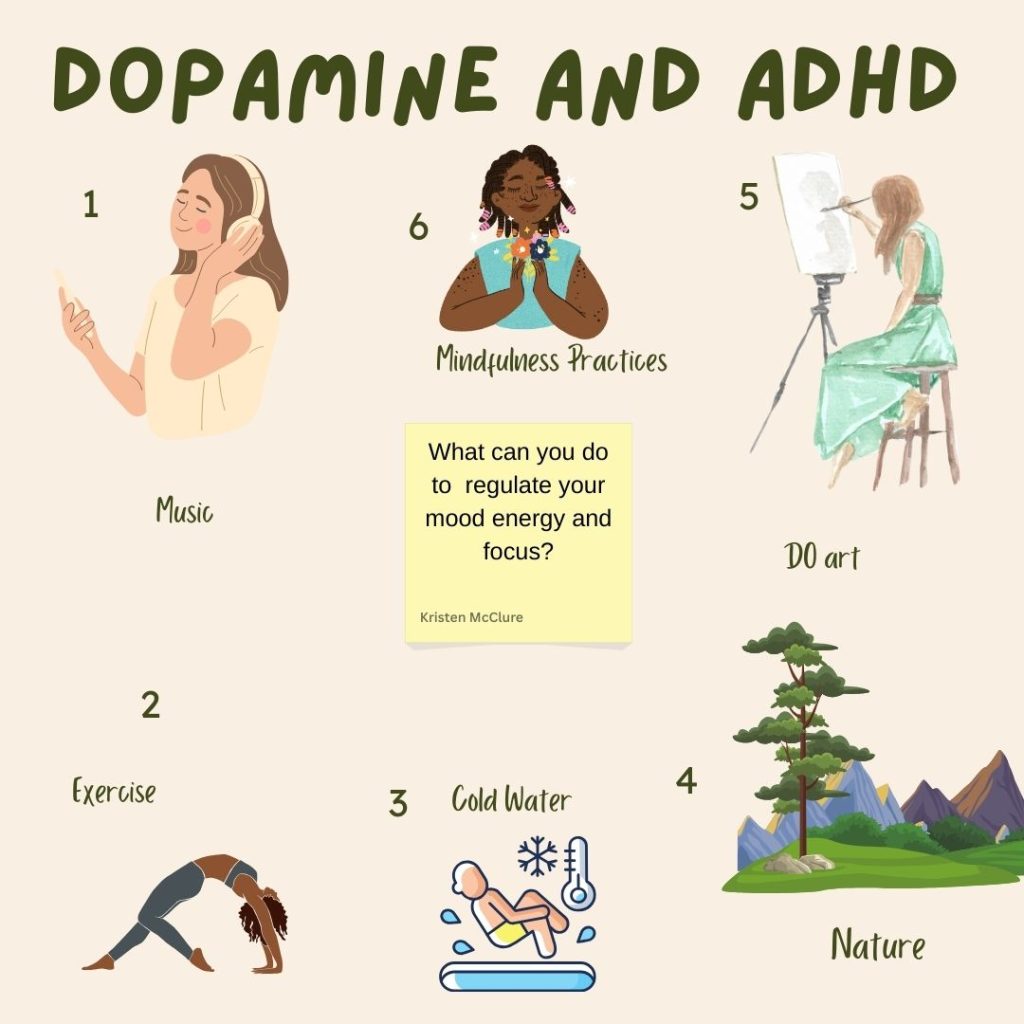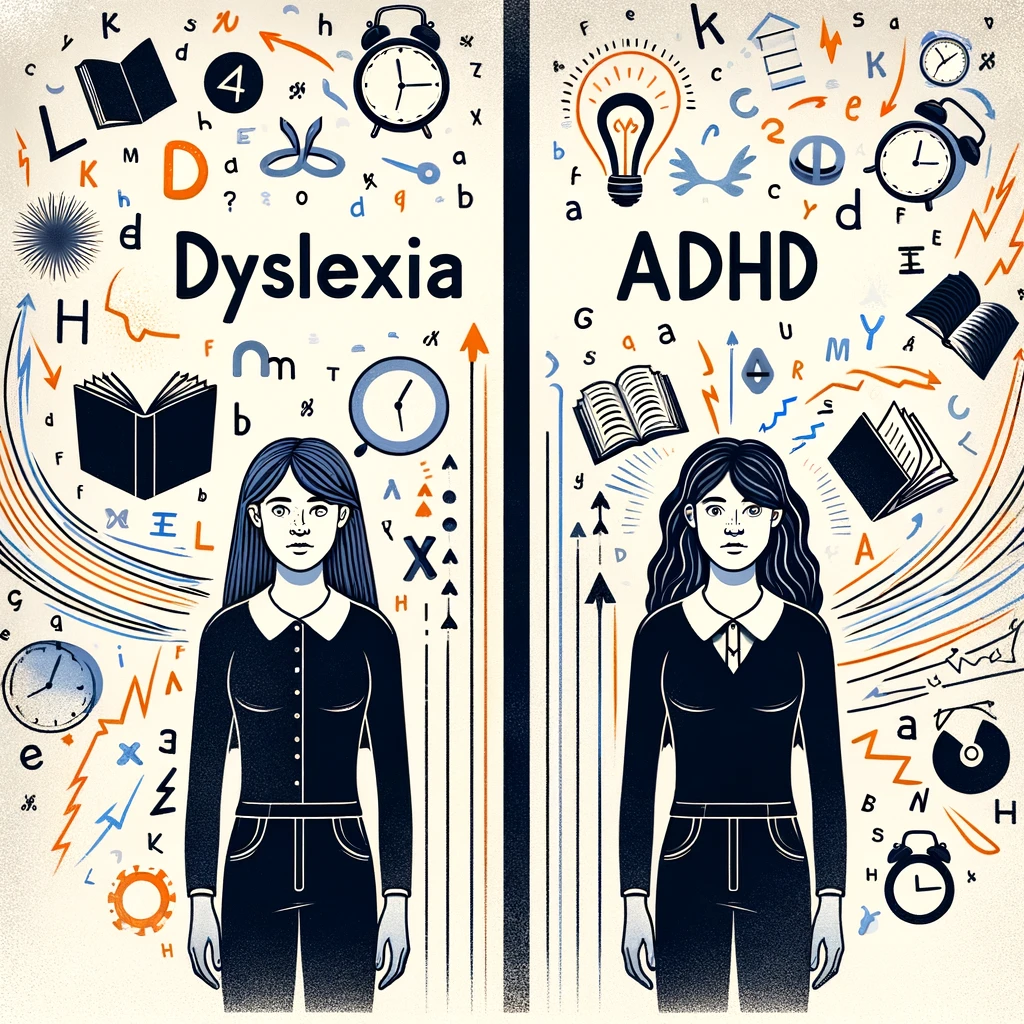Understanding ADHD and Dopamine: Regulation Ideas

Understanding Dopamine: The Brain's Chemical Messenger
Dopamine is a neurotransmitter that plays a crucial role in how we feel pleasure, think, and plan. It’s heavily involved in the brain’s reward system. Dopamine helps us keep going when we want to quit and helps us feel good when we accomplish things. Dopamine impacts attention, motivation, and emotional regulation.
What Is the Connection Between Dopamine and ADHD?
In ADHD people, there is often a dysregulation of dopamine levels. This dysregulation leads to symptoms such as inattention, time blindness, emotional regulation issues, impulsivity, and hyperactivity. Here’s a quick breakdown of how dopamine dysregulation impacts those with ADHD.
Dopamine Dysregulation:
ADHD people seem to have dysregulated dopamine, sometimes too much, sometimes too little.
Altered Reward Pathways:
ADHDers have altered reward pathways. This means that their brains respond differently to rewards and gratification. This is partly why tasks that are not immediately rewarding can be particularly hard.
How Do Issues with Dopamine and ADHD Impact Everyday Life?
Dopamine dysregulation doesn’t just affect the brain in abstract ways. Here are some ways it impacts daily functioning in the neurotypical world:
- Attention and Focus: It is hard to maintain attention and focus on boring or unrewarding tasks. You might struggle to complete routine tasks like paperwork or household chores.
- Motivation: Dopamine influences motivation and the ability to initiate tasks. You might find it difficult to get started on tasks or projects and feel overwhelmed. This can lead to procrastination and a sense of being stuck.
- Impulsivity: Altered dopamine levels can make it difficult to control impulses if you have the impulsive type of ADHD. You might make hasty decisions or engage in risky behaviors.
- Emotional Regulation: Dopamine plays a critical role in regulating emotions. Dysregulation can lead to mood swings, irritability, and difficulty managing stress. These emotional challenges can strain personal relationships and lead to conflicts.
- Reward Processing: People with ADHD often require more immediate or frequent rewards to stay motivated. This can make long-term projects that lack immediate gratification particularly challenging. You might also find it difficult to plan for and complete future tasks ( temporal processing. . This leads to stress in various areas of life.
- Executive Functioning: Dopamine is involved in executive functions like planning, organizing, and prioritizing. Dysregulation can result in difficulties managing time, keeping track of tasks, and organizing thoughts. This often leads to disorganization, missed deadlines, and extra stress.
What Can You Do to Help and Support Yourself?
Understanding the connection between dopamine and ADHD is the first step. Awareness helps you develop effective strategies to manage symptoms. Here are some practical strategies to help regulate dopamine levels:
- Engage with Art: Artistic activities like painting, drawing, or even just doodling can provide a dopamine boost. The creative process helps engage the brain in a rewarding and calming way, making it easier to focus on more challenging tasks later.
- Spend Time in Nature: Time spent outdoors, whether it’s a walk in the park, gardening, or simply sitting outside, has a grounding effect and has been shown to increase dopamine levels. This can help reduce stress and improve mood.
- Music Interventions: Music interventions for ADHD can increase dopamine levels, improving executive function and timing. Research suggests music can positively affect inhibitory control, working memory, and cognitive flexibility.
- Exercise and Physical Activity: Aerobic exercise or strength training, has been shown to increase dopamine levels. Exercise boosts dopamine release, improves receptor sensitivity, and helps regulate mood and motivation.

- Mindfulness Meditation: Mindfulness practices have been linked to increased dopamine production. Meditation can lead to changes in brain activity that boost dopamine levels.
- Dietary Adjustments: Incorporate foods rich in tyrosine, an amino acid precursor to dopamine. Foods like almonds, bananas, avocados, eggs, and lean meats might naturally boost dopamine levels. Omega-3 Fatty Acids: In fatty fish like salmon, omega-3s have been linked to increased dopamine production and improved receptor function.
- Cold Exposure: Exposure to cold, such as through cold showers or ice baths, has significantly increased dopamine levels. This practice can enhance mood, focus, and resilience to stress.
What Do People Who Love You Need to Understand About ADHD and Dopamine?
Loved ones play a crucial role in supporting someone with ADHD. Understanding that dopamine dysregulation is a core issue can help them provide more empathetic and effective support. Here’s what they should know:
- Be supportive: Support engagement in artistic activities, special interests, and creative expression. Special interests often provide a sense of achievement and a dopamine boost.
- Praise over Criticism: Avoid criticism over what may seem like small accomplishments; instead, focus on the progress being made.
- Understand the Role of Dopamine: Recognize that behaviors such as impulsivity, procrastination, or difficulty completing tasks are often the result of dopamine dysregulation. Approach these behaviors with empathy and support rather than frustration or judgment.
Medication:
Many ADHD medications work by increasing dopamine levels in the brain. These medications stabilize dopamine levels, reducing the severity of ADHD symptoms. Notably, medications improve emotional regulation, time blindness, and improve overall cognitive function.
Wrapping it up:
Understanding dopamine’s role in ADHD can provide valuable insights into why certain challenges arise and how they can be managed. By exploring dopamine-regulating strategies, ADHDers can gain some control over their lives.
Start Helping Yourself Right Now:
-
• How do you notice dopamine-related challenges, like low motivation or trouble focusing, showing up in your daily life?
-
• When you face challenges with emotional regulation or impulsivity, which strategies (like music, exercise, or mindfulness) could you use to better manage your dopamine levels?
-
• How can you adjust your daily routine or environment to make it easier to complete tasks that are typically boring or unrewarding for you?




